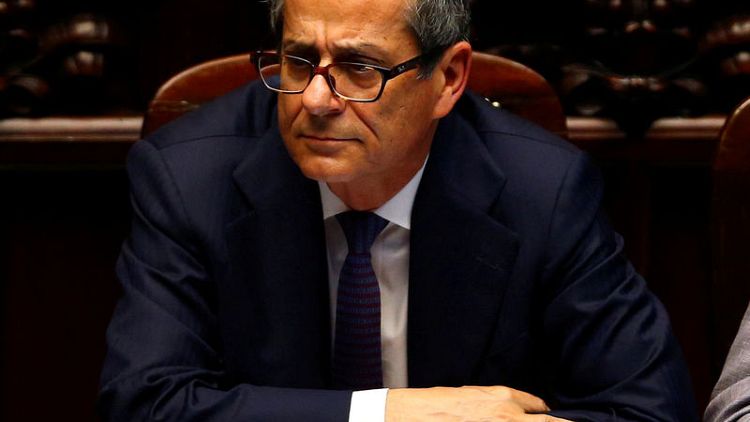By Giuseppe Fonte and Angelo Amante
ROME (Reuters) - Italy's new government proposed a 2019 budget that would set a deficit target three times as big as the previous administration's goal, setting up a clash with the European Commission and sparking a sell-off of state bonds.
Italy has the heaviest debt burden among big EU economies, at about 130 percent of gross domestic product. It is under pressure from the European Union to rein in spending amid fears it could sow the seeds of a debt crisis in the heart of the euro zone.
The four-month-old government late on Thursday night offered a budget with a deficit of 2.4 percent of GDP for the next three years, to fund a major expansion of welfare spending, tax cuts and a boost to public infrastructure investment.
It marked a victory for ruling-party chiefs over Economy Minister Giovanni Tria, an unaffiliated technocrat.
Tria had initially wanted a deficit set as low as 1.6 percent next year, hoping to respect European Union demands that Italy progressively cut the fiscal gap to rein in its debt.
The euro slumped on the news overnight before recovering ground. Yields on Italian government bonds hit three-week highs on Friday, though fears among some Rome officials of a savage selloff were avoided.
"They seem to be on a collision course with Brussels," said ING rates strategist Martin van Vliet.
European Economics Commissioner Pierre Moscovici said on Friday he would respond to Italy's 2019 budget next month but said the nation must cut its "explosive" debt.
The coalition government of the 5-Star Movement and the League, which took power in June, had been pushing for a deficit around 2.4 percent of GDP to fund costly campaign promises. Tria had been slowly shifting his position but trying to hold out for something below 2.0 percent.
"There is an accord within the whole government for 2.4 percent, we are satisfied, this is a budget for change," 5-Star leader Luigi Di Maio and League chief Matteo Salvini said in a joint statement after meetings with Tria.
The statement appeared to refer only to the 2019 deficit target, but government officials and Justice Minister Alfonso Bonafede later said the same deficit level would be maintained for three straight years to 2021.
The policy marks a striking shift from the previous centre-left administration, which had targeted a deficit of 0.8 percent of GDP in 2019 and a balanced budget in 2020.
Tria did not immediately comment, but Di Maio and other government officials said he had no intention of resigning.
President Sergio Mattarella, the head of state, called Tria late on Thursday to ask him not to resign and stay on to avoid market uncertainty, several Italian newspapers said on Friday.
"From now on things will be tough for Italy," said Armando Marozzi, analyst at Medley Global Advisors. "The European Commission will reject this budget and next month ratings agencies are likely to downgrade Italian bonds."
A meeting of the full cabinet to sign off on the government's economic and financial targets for the next three years ended at around 11 p.m. (2100 GMT) with no news on targets for economic growth or the public debt.
Prime Minister Giuseppe Conte said on Facebook that the budget goals were "considered, reasonable and courageous" and would "ensure more robust economic growth and significant social progress for our country."
He said the budget plan included "the biggest programme of public investments ever carried out in Italy."
The coalition parties say the priority must be financing policies including a basic income for the poor and a reduction in the minimum retirement age, rather than meeting deficit goals previously agreed with Brussels.
A 2.4 percent deficit target remains inside the 3.0 percent ceiling prescribed by EU rules, but Italy had promised Brussels it would cut the deficit decisively to curb its mammoth debt.
(Additional reporting by Gavin Jones in Rome and Abhinav Ramnarayan in London; Writing by Gavin Jones and Steve Scherer; Editing by Mark Bendeich, Larry King)



